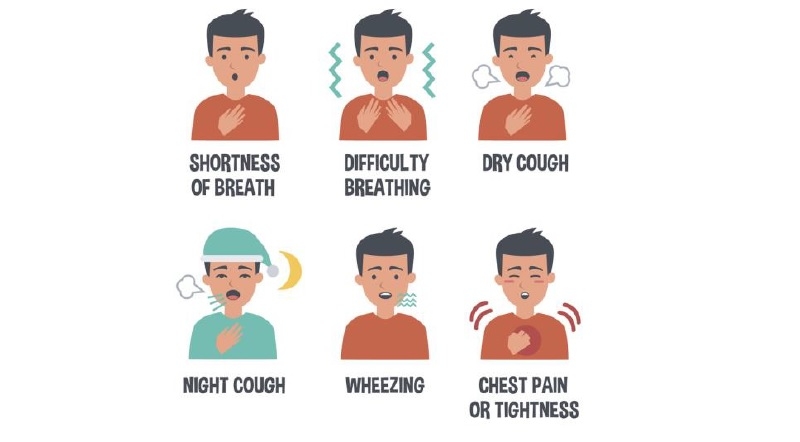If you or a family member currently suffer from asthma, below we provide some information on the condition and education on how to cope.

What is Asthma?
Asthma is a lung disorder that obstructs breathing, it can affect any age group, however it normally starts in early years. Recurrent breathlessness and wheezing are some of the common signs and symptoms, the severity of which can vary from person to person. It occurs due to inflammation of air passages in the lungs and can irritate the nerve endings in the airways. During an asthma attack, the lining of this passage swells, narrowing the airway and reducing air flow in and out of the lungs.
If you have asthma, you have it all the time, but you will have asthma attacks only when something bothers your lungs.
Key Facts
- Asthma is one of the major noncommunicable diseases. It is a chronic disease of the air passages of the lungs which inflames and narrows them.
- Some 334 million people currently suffer from asthma. It is a common disease among children.
- Most asthma-related deaths occur in low- and lower-middle income countries.
- The strongest risk factors for developing asthma are inhaled substances and particles that may provoke allergic reactions or irritate the airways.
- Medication can control asthma. Avoiding asthma triggers can also reduce the severity of asthma
- Appropriate management of asthma can enable people to enjoy a good quality of life.
The causes of Asthma
The fundamental causes of asthma are still not fully understood, however in most cases it is linked to hereditary as well as environmental factors.
The strongest risk factors for developing asthma are a combination of genetic predisposition with environmental exposure to inhaled substances and particles that may provoke allergic reactions or irritate the airways, such as:
- Indoor allergens (for example, house dust mites in bedding, carpets and stuffed furniture and pet dander)
- Outdoor allergens (such as pollens and moulds)
- Sulfites in certain foods
- Tobacco smoke
- Chemical irritants in the workplace
- Air pollution
- Cold air
- Extreme emotional arousal (such as anger fear or stress)
- Physical exercise
What Is an Asthma Attack?
How Can You Tell if You Have Asthma?
It can be hard to tell if someone has asthma, especially in children under age 5.
- Do you cough a lot? (especially at night)
- Do you have breathing problems?
- Are breathing problems worse after physical activity or at certain times of the year?
- Do you have chest tightness or wheezing?
- Do you have a family history of asthma?
If you are concerned consult your doctor. Ask your doctor to check how well your lungs work and check for allergies, which can help determine if you have asthma.
Treatment and control
Although asthma cannot be cured, appropriate management can control the disease and enable those affected by it to enjoy a good quality of life.
Short-term medications are used to relieve symptoms. Medications such as long-term inhaled steroids are needed to control the progression of severe asthma.
People with persistent symptoms may take long-term medication daily to control the underlying inflammation and prevent symptoms and exacerbations.
Your International Health Insurance Cover
We know it can be difficult to obtain international health insurance when you have a pre-existing condition, like Asthma. A pre-existing condition is a medical condition or any related condition for which one or more symptoms have been displayed at some point during your lifetime, irrespective of whether any medical treatment or advice was sought.
Being an expat abroad is difficult enough without having to worry about not being covered for a pre-existing condition. Fortunately, we have an extensive range of covered pre-existing medical and dental conditions for individuals and employees of small underwritten groups.
Allianz Worldwide Care international health insurance
Get an individual international health insurance quote or more information on group international health insurance, online now.


